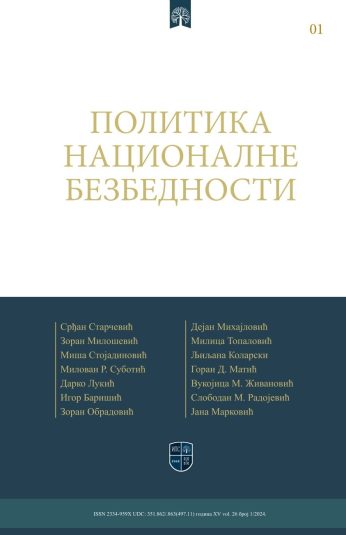Main topic
ARTICLES AND STUDIES
(UN)ATTAINABILITY OF CERTAIN NATIONAL INTERESTS PROCLAIMED IN THE NATIONAL SECURITY STRATEGY OF THE REPUBLIC OF SERBIA
Abstract
In the latest National Security Strategy of the Republic of Serbia, the part related to national interests defined overall seven most important national interests further operationalized in the part “The National Security Policy” (Article 4 of the Strategy). National interests articulated through this Strategy are clearly delineated with their vocational meaning, but through careful analysis we will notice that all of them have distinct causality. Therefore, the implementation of any of delegated interests will be impossible if we comprehend them as untouchable. Their complementarity is so capillary it is even impossible to group them. Shortly, there is no achievable “checklist” for protecting and implementing these delegated interests. In contemporary world marked with emphasized interconnection, interests delegated in this manner are complementary with the scope of international reality. The problematic part is their attainability (feasibility). That is why the key point of this paper, besides pointing out the unequivocal capillarity between them, is to analyse the attainability of certain national interests in their direct correlation. Specifically, simultaneous (un)attainability – (in)feasibility of national interests no. 1 (“Preservation of the sovereignty, independence and territorial integrity”) and national interests no. 5 (“European integration and membership in the European Union”). It is clear that the key issue for harmonizing relations between the two national interests is related to the unresolved status of southern Serbian province. That is why the paper further seeks for possible models which could enable the “reconciliation” of these seemingly irreconcilable interests. Delegated models are represented through temporal elaboration of two situations. The first situation is the extension of the “frozen” conflict, and it is delegitimized in the context of the fifth interest. The second situation implies the achievement of agreement between Belgrade and Priština (Serbia does not recognize Kosovo, but is obliged not to block its accession into international institutions). In the second example this concept is operationalized through three most important points: 1) Serbia de jure does not recognize Kosovo independence, but is obliged not to block the so-called Kosovo state in international organizations membership; 2) temporary institutions in Priština are obliged to establish the “Community of Serbian Municipalities” with complete autonomy in the areas of education, culture, language, local self-government, and healthcare; 3) the European Union guarantees that, besides the achieved agreement, there will not be necessary to formally recognize Kosovo independence for Serbian accession to the European Union. Finally, the paper does not suggest that this option is the best possible, but that it is based on attainability of underlined intertwined national interests proclaimed in the Strategy. Solutions for such “eternal” issue are probably many. Solutions which would “reconcile” national interests delegated in such manner are not so numerous. This presentation is certainly a contribution to one of them, which is probably the only one.
References
- Bergin, Joseph. 2009. „Three faces of Richelieu: a historiographical essay“. French History Advance Access, 23(4), 517-536.
- Beta. 2019. „Tramp imenovao specijalnog izaslanika za dijalog Beograda i Prištine“. 4. oktobar.
- Гајић, Александар Саша. 2020. „Безбедносне стратегије малих држава у савременом свету: случај Србије“. Политика националне безбедности бр. 2, 63-87.
- Гаћиновић, Радослав. 2018. „Политика безбедности малих држава“. Српска политичка мисао бр. 1, 169-183.
- Gligorov, Vladimir. 2009. „Državni i nacionalni interesi“. Peščanik, 22. oktobar.
- Danas. 2007. „Kontraproduktivno vezivati Kosovo i evropske integracije Srbije“, 26. jun 2007.
- Dimitrijević, Vojin. 2009. „Teškoće u definisanju nacionalnog interesa Srbije“. У: Srbija je važna: unutrašnje reforme i evropske integracije – Zbornik radova (prir. Volfgang Petrič, Goran Svilanović, Kristof Solioz). Beograd: Samizdat B92.
- Elman, Miriam F. 1995. „The Foreign Policies of Small States: Challenging Neorealism in Its Own Backyard”. British Journal of Political Science, No. 2, 171-217.
- European Western Balkans. 2020. „Lajčak: Dijalog Beograda i Prištine je jasno povezan sa evropskom budućnošću Kosova i Srbije“, 12. 10. Dostupno na: https://europeanwesternbalkans.rs/lajcak-dijalog-beograda-pristine-je-jasno-povezan-sa-evropskom-buducnoscu-kosova-srbije/
- Ilić, Zorica. 2011. „Petrič: Carine su političko oružje“. Deutsche Welle, 27. novembar 2011.
- Канцеларија за Косово и Метохију. 2018. „Асоцијација/Заједница општина са већинским српским становништвом на Косову – општи принципи/главни елемент“. Доступно на: https://web.archive.org/web/20180117190442/http://www.kim.gov.rs/p17.php
- Kisindžer, Henri. 2006. Diplomatija. Beograd: BMG.
- Kovačević, Dušan i Cvetković, Sandra. 2020. „Srbija i Kosovo potpisali sporazum o normalizaciji ekonomskih odnosa“. Radio Slobodna Evropa, 4. septembar.
- Липовац, Милан и Димитријевић, Иван. 2015. „Национални интерес као аналитички концепт: могућност за анализу националног интереса Србије“. Српска политичка мисао бр. 4, 87-108.
- Morgenthau, Hans J. 1952. „Another Great Debate: The National Interest of the United States“. American Political Science Review, No 4, 961-988.
- Недељковић, Стефан. 2014. „Односи Србије и Косова у контексту европских интеграција“. Култура полиса, бр. 25, 29-46.
- Radio Slobodna Evropa. 2020. „Srbija i Kosovo: Potpisani sporazumi o autoputu i železnici“, 14. februar. Dostupno na: https://www.slobodnaevropa.org/a/srbiaj-kosovo-sporazum-autoput-zeleznica/30434613.html.
- РТС. 2020. “Мирослав Лајчак именован за специјалног представника ЕУ за дијалог Београда и Приштине“, , 3. април 2020. Доступно на: https://www.rts.rs/page/stories/ci/story/1/politika/3911111/miroslav-lajcak-specijalni-predstavnik-zapadni-balkan.html
- Samardžić, Slobodan. 2009. „Problem Kosova i Metohije iz ugla evropskih integracija-secesija Kosova kao pitanje odnosa EU i Srbije”. U: Srbija u procesu pridruživanja EU, ur. Slobodan Samardžić, 219-230. Beograd: Službeni glasnik.
- Симић, Р. Драган. 2002. Наука о безбедности. Београд: Службени лист СРЈ, Факултет политичких наука.
- Sondermann, Fredrich A. 1977. „The concept of the national interest“. Orbis: A Quarterly Journal of World Affairs, No 21, 121-138.
- Стратегија националне безбедности Републике Србије. 2019. „Службени гласник РС“, број 94 од 27. децембра 2019.
- Суботић, Милован. 2020. „Геополитички аспекти редефинисане државне моћи на примеру ЕУ и Балкана“. Политика националне безбедности бр. 2, 89-111.
- Hill, Christopher. 2003. The Changing Politics of Foreign Policy. New York: Palgrave MacMillan.
- CorD. 2019. “Matthew Palmer’s Appointment as Special Representative for the Western Balkans”, 31 August 2019.

